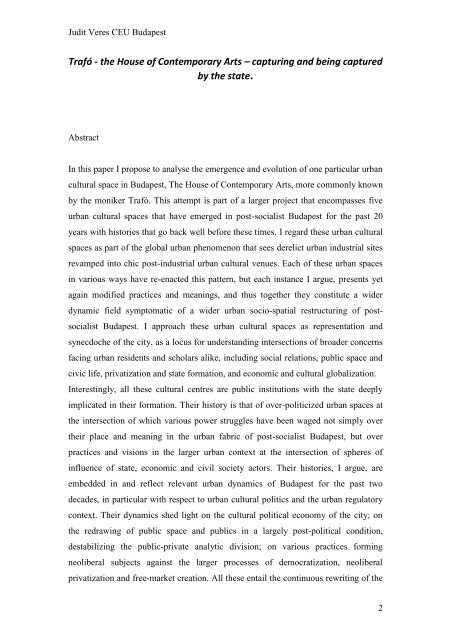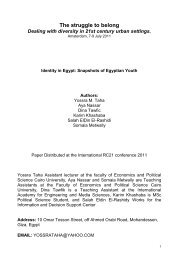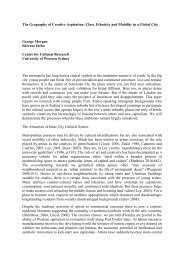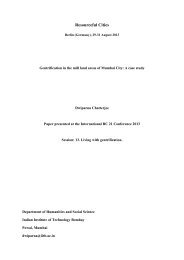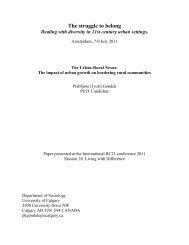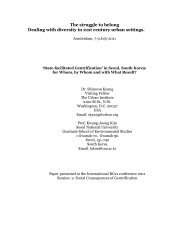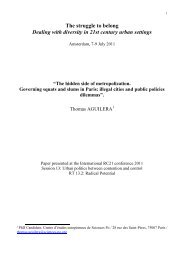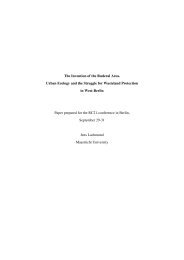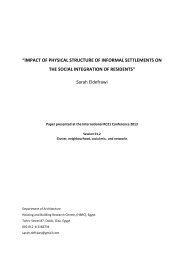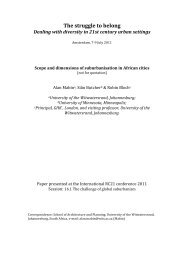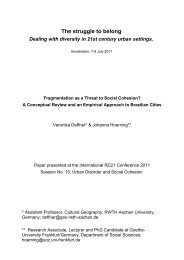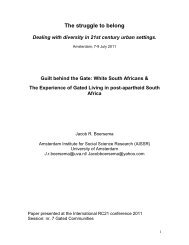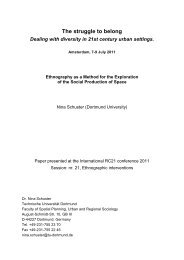Gentrification as a broad process of reurbanization - RC21 ORG ...
Gentrification as a broad process of reurbanization - RC21 ORG ...
Gentrification as a broad process of reurbanization - RC21 ORG ...
You also want an ePaper? Increase the reach of your titles
YUMPU automatically turns print PDFs into web optimized ePapers that Google loves.
Judit Veres CEU Budapest<br />
Trafó - the House <strong>of</strong> Contemporary Arts – capturing and being captured<br />
by the state.<br />
Abstract<br />
In this paper I propose to analyse the emergence and evolution <strong>of</strong> one particular urban<br />
cultural space in Budapest, The House <strong>of</strong> Contemporary Arts, more commonly known<br />
by the moniker Trafó. This attempt is part <strong>of</strong> a larger project that encomp<strong>as</strong>ses five<br />
urban cultural spaces that have emerged in post-socialist Budapest for the p<strong>as</strong>t 20<br />
years with histories that go back well before these times. I regard these urban cultural<br />
spaces <strong>as</strong> part <strong>of</strong> the global urban phenomenon that sees derelict urban industrial sites<br />
revamped into chic post-industrial urban cultural venues. Each <strong>of</strong> these urban spaces<br />
in various ways have re-enacted this pattern, but each instance I argue, presents yet<br />
again modified practices and meanings, and thus together they constitute a wider<br />
dynamic field symptomatic <strong>of</strong> a wider urban socio-spatial restructuring <strong>of</strong> postsocialist<br />
Budapest. I approach these urban cultural spaces <strong>as</strong> representation and<br />
synecdoche <strong>of</strong> the city, <strong>as</strong> a locus for understanding intersections <strong>of</strong> <strong>broad</strong>er concerns<br />
facing urban residents and scholars alike, including social relations, public space and<br />
civic life, privatization and state formation, and economic and cultural globalization.<br />
Interestingly, all these cultural centres are public institutions with the state deeply<br />
implicated in their formation. Their history is that <strong>of</strong> over-politicized urban spaces at<br />
the intersection <strong>of</strong> which various power struggles have been waged not simply over<br />
their place and meaning in the urban fabric <strong>of</strong> post-socialist Budapest, but over<br />
practices and visions in the larger urban context at the intersection <strong>of</strong> spheres <strong>of</strong><br />
influence <strong>of</strong> state, economic and civil society actors. Their histories, I argue, are<br />
embedded in and reflect relevant urban dynamics <strong>of</strong> Budapest for the p<strong>as</strong>t two<br />
decades, in particular with respect to urban cultural politics and the urban regulatory<br />
context. Their dynamics shed light on the cultural political economy <strong>of</strong> the city; on<br />
the redrawing <strong>of</strong> public space and publics in a largely post-political condition,<br />
destabilizing the public-private analytic division; on various practices forming<br />
neoliberal subjects against the larger <strong>process</strong>es <strong>of</strong> democratization, neoliberal<br />
privatization and free-market creation. All these entail the continuous rewriting <strong>of</strong> the<br />
2


